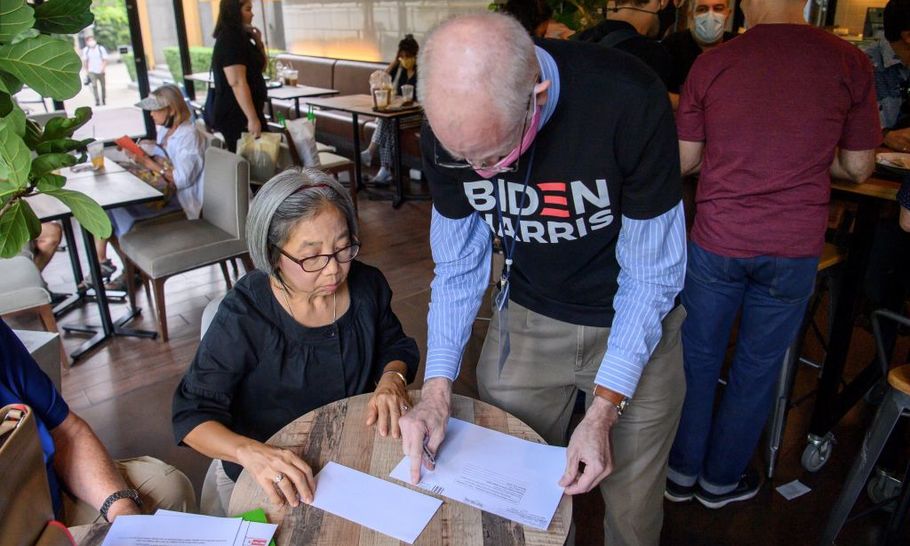Is democracy in America under threat? Both sides should put up or shut up

(Photo by MLADEN ANTONOV/AFP via Getty Images)
Donald Trump is in trouble. The polls have scarcely moved in a month — and they all point to a landslide victory for Joe Biden. The President still has a chance, not least in the three televised debates with his Democratic challenger that are scheduled over the next month. But with just 38 days to go until the election on November 3, the odds are stacking up against the incumbent. Time is running out for Trump to turn the tables on Biden.
It is hardly surprising, therefore, that a President whose very identity is predicated on the notion that he can never be a “loser” is casting doubt on the legitimacy of the electoral process — in particular, the unusually large number of postal ballots. He has repeatedly refused to make any commitment to a peaceful transfer of power if his opponent wins. Asked if he would do so on Wednesday, Trump replied: “Well, we’re going to have to see what happens… The ballots are a disaster.” On Thursday he again raised the question of “unsolicited ballots”, adding: “We want to make sure the election is honest and I’m not sure that it can be.”
Trump has produced no evidence so far to support his claims, although the FBI Director Christopher Wray told a Senate committee this week that he was “in no way minimising” the danger of electoral fraud. Early voting began this week in some states, with long queues of voters to cast their ballots. By definition, postal votes are not secret ballots. As Wray conceded, though, there has been no history of large-scale co-ordinated mail-in fraud in America. The White House is playing up reports of small numbers of discarded ballot papers found in Pennsylvania and Wisconsin, two swing states. But such local cases do not begin to justify claims that the whole election might be rigged.
In response to such sensational allegations emanating from the President himself, senior Republicans, led by the Senate majority leader Mitch McConnell, have sought to allay fears that the President might refuse to leave office. “There will be an orderly transition, just as there has been every four years since 1792,” Senator McConnell breezily declared.
A disputed election is, however, looking increasingly likely. In anticipation of legal challenges in several states where a high proportion of postal ballots is expected, both Republicans and Democrats have assembled large teams of lawyers. Unless Biden wins by a margin so large as to extinguish all doubt, the result of the 2020 US election will most probably end up in the courts. As the stakes could hardly be higher, this in practice means that the Supreme Court will decide who will occupy the White House for the next four years.
Hence the importance of the President’s nomination of a new justice to succeed the late Ruth Bader Ginsburg, who died a week ago. By restoring to the Court its full complement of nine, the newly appointed justice would in effect have a casting vote. But the Democrats have sworn to impede the confirmation of Trump’s nominee in the Senate by fair means and foul. Given that time is short, they may succeed. If they do, the Court risks being deadlocked on any possible disputed election.
Constitutionally, the Democrats have no more justification for denying Trump’s right to nominate a new Supreme Court justice than the President has to undermine the electoral process. In fact, both actions are equally irresponsible. Historically, there have been 29 nominations to the Supreme Court in an election year. In 19 of these cases, the President and Senate belonged to the same party, as is the case today. In all but two of these, the Senate confirmed the nominee. On the ten occasions when the White House and Senate were controlled by different parties, as was the case in 2016, only two justices were confirmed.
What this means is that Mitch McConnell has good grounds for setting aside the 2016 precedent, when he and other Republican senators refused to confirm President Obama’s nominee, and pressing ahead with the confirmation of President Trump’s choice, due to be announced today. Those who care about democracy and the rule of law in the United States should respect the integrity both of the electoral process and the Supreme Court, which could prove vital in the aftermath of November 3.
There are many reasons why we should fear the consequences of a disputed election, especially if there is no impartial arbiter to resolve the crisis. Senator Mitt Romney, the former Republican presidential candidate and one of Trump’s harshest critics, outlined the danger succinctly: “Fundamental in democracy is the peaceful transition of power; without that, there is Belarus.” If the White House has proof of organised fraud involving postal ballots, Trump should produce it. If the Democrats have a legitimate objection to the new Supreme Court nominee, they should produce it. In other words, both Trump and Biden should put up or shut up.





